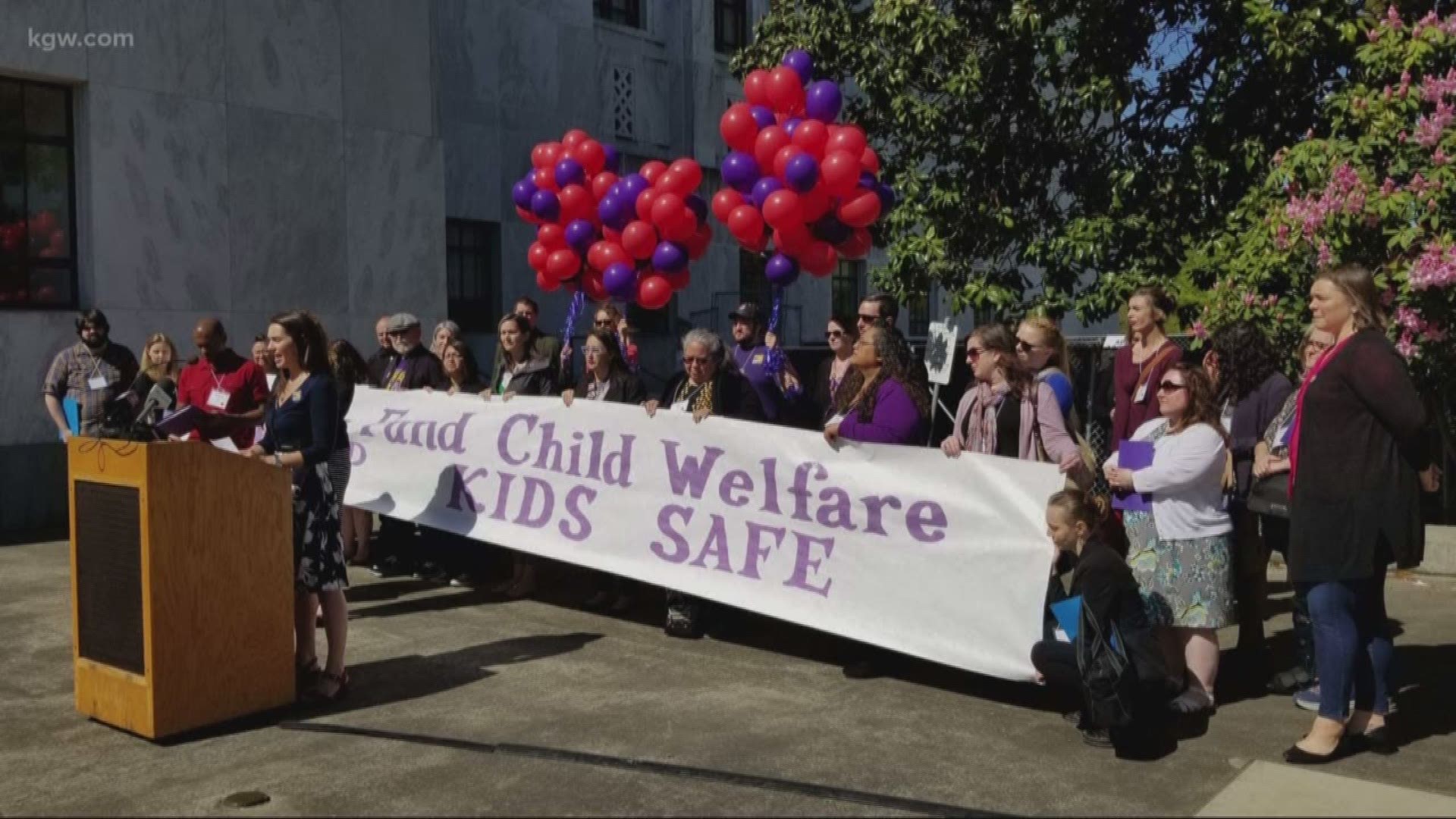SALEM, Ore — Dozens of caseworkers rallied at the state Capitol Tuesday for full funding of Oregon's foster care system, saying a severe staffing shortage has caused high burnout and turnover among current employees.
"Our current caseloads are more than double and sometimes approaching triple of what they should be," said Rosanne Scott, a caseworker from Portland. "This is way more work than one person can manage, and it means they're not able to do all the things our kids need us to do for them."
“Throughout the time that I’ve been doing it things have just gotten tougher. We’ve gotten less and less of the resources we need, and it’s just gotten harder to serve the kids that we’re supposed to,” Scott said.
The Department of Human Services, which oversees the state's foster care system, has struggled for years to recruit and retain caseworkers, who work to find adequate foster homes for each of the 7,500 children in state care.
The Service Employee International Union Local 503, which represents public sector workers, said an additional $80 million is needed to properly address problems in recruiting and retaining caseworkers.
And, although Gov. Kate Brown requested an additional $14.5 million last summer to add nearly 200 workers, caseworkers say they need more funds to meet staffing needs.
In a February update to the governor, DHS said that it would need to hire over 1,000 child welfare workers and support staff in order to bring down worker caseload levels to the national average. The department is particularly struggling with a shortage of permanency workers, who are supposed to evaluate potential homes for children based on their individual needs.
According to the national standard, permanency workers should have a workload of 11 cases. The department found it had 36% of staffing levels needed to achieve that rate and would need an additional 900 full time workers to bring individual caseload levels down.
"Our caseworkers are overwhelmed and are not able to engage with our children and families to understand their culture, assess their strengths and find the root cause of why the family is struggling," the report said.
When a child’s future is on the line, Scott said it deserves a 100% commitment. That is why she and her fellow caseworkers, staff members, and advocates continue to call on lawmakers to act.
“When we put kids in foster care in the state system, the state has an obligation to care for them. So, I think we're here today to ask the state to keep their promise to Oregon's foster kids to do the right thing and to care for them in the way that we're supposed to,” Scott said.
The department has also been slow to fill vacancies, and the most recent update to the governor shows that only 8% of 300 available positions have been filled. At least 220 people are currently in the hiring process, and 73 positions remain vacant.
Caseworkers say DHS needs to do more to retain the staff it already has, as high workloads and a lack of proper training have caused high turnover rates. A 2018 secretary of state audit found worker burnout caused a 23% turnover rate among staff in 2016, and caseworkers say that often people leave the profession within two years.
Scott, who has been a caseworker for 18 years, said recently the turnover rate has been the highest she's ever experienced. She said she's personally taken over the cases of 19 kids after their caseworkers left their jobs. That's in addition to her current caseload.
She said it's not only hard on the kids but also on the caseworkers themselves, who often feel demoralized and as though they can't truly help children in need.
"It's really sad to lose people who could contribute so much to the system because of a dangerously crushing workload that makes you feel like you're totally inadequate and you can never be enough," she said.
Marissa Johnson is an advocate with Foster Homes of Healing.
“We believe we need to expand the capacity to serve these kiddos across the system, period,” Johnson said.
Foster Homes of Healing is a coalition of 10 organizations from across the state that are dedicated to improving foster care in Oregon through legislative action.
“At every point along the spectrum we have a lack of support for individuals in the child welfare system. That means we have a lack of resources for prevention, a lack of resources for recruiting and retaining foster parents, recruiting and retaining case work staff, lack of placement availability,” Johnson said.
As a former foster care parent Johnson knows firsthand the complexities of caring for children in the system, but says those challenges should not be a barrier to finding real solutions.
“The basic needs, the most basic needs of security and having a place – a place to live. I can’t think of anything more foundational than that,” she said. “So, this issue of foster care and the placement that we need and support we need is a truly foundational issue for the life of this child.”

